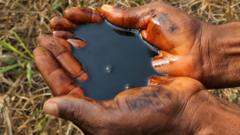Evidence reported by the BBC suggests that Shell ignored multiple warnings about the alleged corruption and failures of their oil spill remediation process, impacting the health and livelihoods of local communities in Ogoniland.
Shell Ignored Warnings of Oil Spill Remediation Failures, Whistleblower Claims

Shell Ignored Warnings of Oil Spill Remediation Failures, Whistleblower Claims
A BBC investigation reveals Shell's alleged negligence concerning oil spill clean-up failures in Nigeria's Ogoniland, leading to widespread health and environmental issues.
The clean-up program for oil-contaminated areas in Nigeria's Ogoniland, funded by Shell and other oil companies, has been plagued with issues over the past eight years. Despite claims of progress from Shell and the Nigerian government, a whistleblower has called the operation a "scam," alleging negligence and corruption. The $1 billion initiative was proposed following a 2011 UN report highlighting the severe pollution crisis affecting the community.
Internal documents reveal that numerous warnings about the agency managing the clean-up, the Hydrocarbon Pollution Remediation Project (Hyprep), went unheeded. The allegations include hiring inexperienced contractors, falsifying laboratory results, and blocking audits. Consequently, local residents continue to suffer from contaminated water and health risks, often forced to buy clean water at exorbitant prices.
One resident, Grace Audi, spoke about her family's reliance on a polluted borehole for water, while others like Paulina Agbekpekpe recounted the devastating effects of oil spills on their fishing livelihoods. A significant portion of the region's population is reportedly suffering from health issues related to oil contamination.
Amid ongoing legal battles facing Shell, which may lead to increased accountability, local advocates express skepticism about the company's future stewardship of Ogoniland. As Shell prepares to divest its Nigerian assets, calls for immediate and effective clean-up efforts grow louder amid fears of further environmental degradation.
Internal documents reveal that numerous warnings about the agency managing the clean-up, the Hydrocarbon Pollution Remediation Project (Hyprep), went unheeded. The allegations include hiring inexperienced contractors, falsifying laboratory results, and blocking audits. Consequently, local residents continue to suffer from contaminated water and health risks, often forced to buy clean water at exorbitant prices.
One resident, Grace Audi, spoke about her family's reliance on a polluted borehole for water, while others like Paulina Agbekpekpe recounted the devastating effects of oil spills on their fishing livelihoods. A significant portion of the region's population is reportedly suffering from health issues related to oil contamination.
Amid ongoing legal battles facing Shell, which may lead to increased accountability, local advocates express skepticism about the company's future stewardship of Ogoniland. As Shell prepares to divest its Nigerian assets, calls for immediate and effective clean-up efforts grow louder amid fears of further environmental degradation.




















